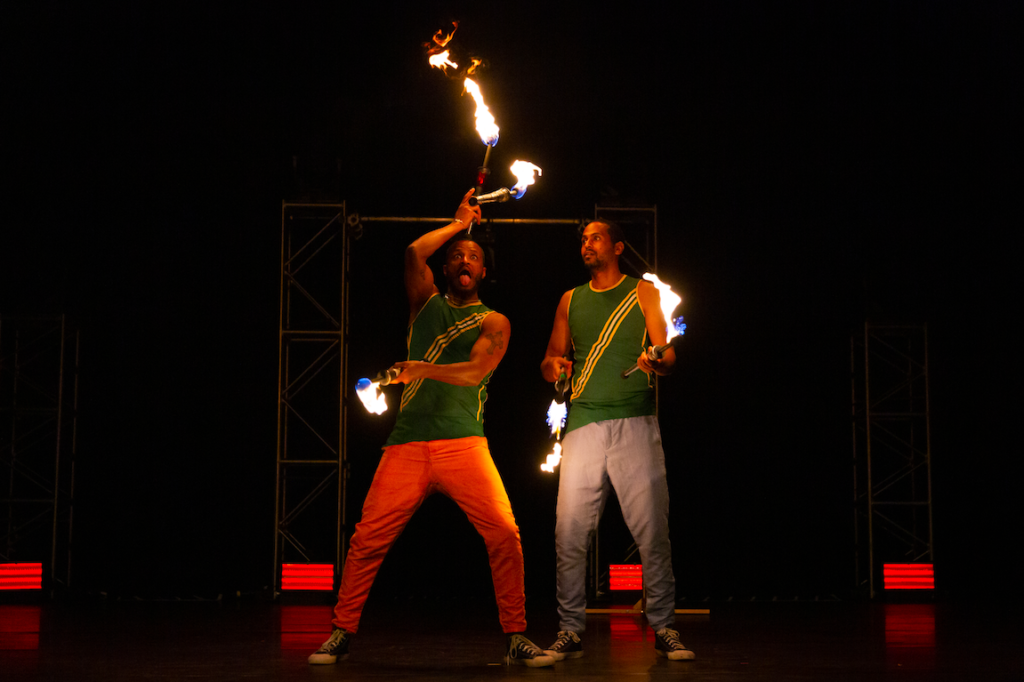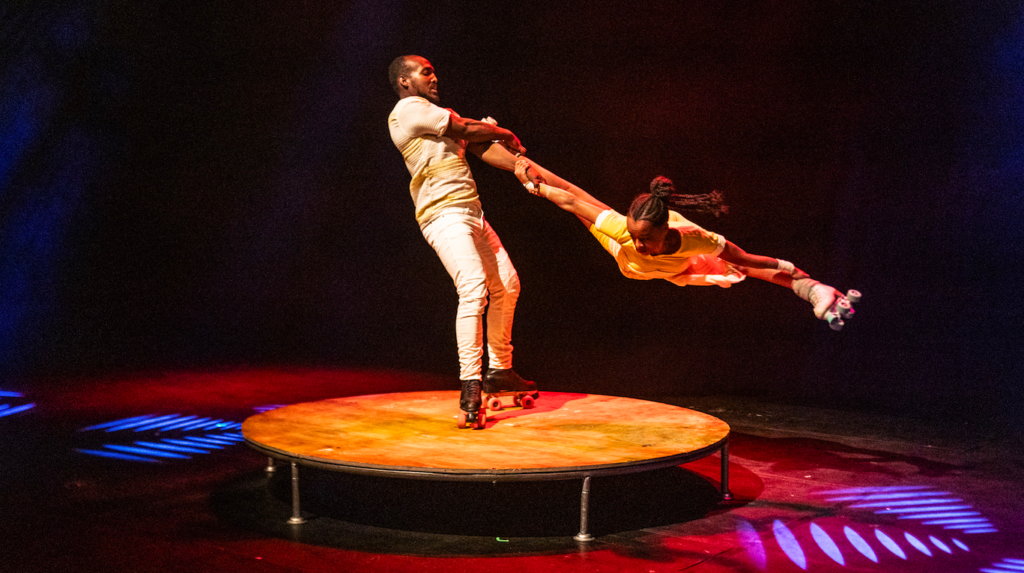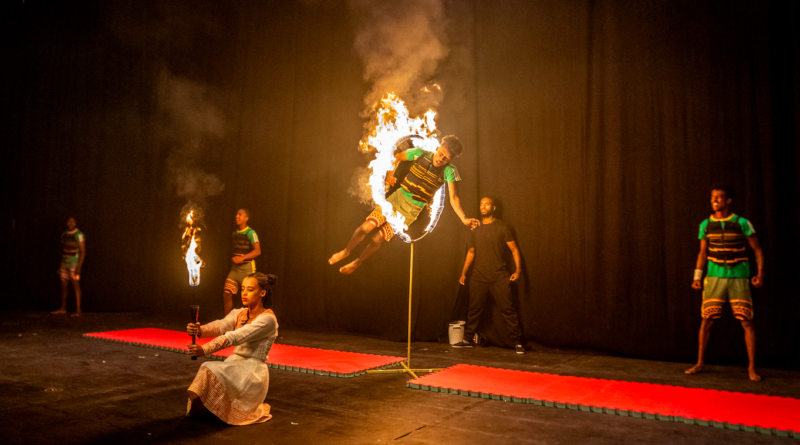INTERVIEW: Circus Abyssinia honors Olympic gold medalist with ‘Tulu’ show
Photo: Circus Abyssinia presents Tulu at the New Victory Theater in Midtown Manhattan. Photo courtesy of Craig Sugden / Provided by the New Victory Theater with permission.
The New Victory Theater, the preeminent theater company geared toward the young and young at heart, has played host to the spirited Circus Abyssinia this holiday season. The circus company’s new show is called Tulu, named after Derartu Tulu, the famed Olympic gold medalist from Ethiopia, where Circus Abyssinia is based. Throughout the one-hour, intermissionless show, the performers bring Tulu’s competitiveness, strength and agility to life on the New Victory’s stage.
The performance features everything from fire jugglers to hand vaulting to roller skating. In fact, it’s the roller skating duet of Betelhem Djene Tola and Befekadu Esmael Awol that feels like the most death-defying act. They hold each other’s hands and spin in circles atop a raised platform in a dazzling display of concentration and poise.
There’s also a Russian swing, contortion artist, roller blading, aerial work, hoop diving and hand balancing. Fitting everything into one hour is a minor miracle, but the skilled performers pull off the feat with unwavering dedication, and the audience members, many of them first-time theatergoers, clap along, enjoying not only the circus acts but also the funky score and Ethio-pop tunes.
Mehari “Bibi” Tesfamariam is the producer and co-creator of Tulu, and Binyam “Bichu” Shimellis is the director and co-creator. Together they are known as Bibi and Bichu, and they rightfully receive top billing in the program, even above the show’s name. They also perform several of the circus numbers themselves, including when they pair together as fire jugglers. New Yorkers saw their company four years ago when they brought Ethiopian Dreams to the New Victory in 2018 (the company was only founded the year prior to that engagement).
Recently Bichu exchanged emails with Hollywood Soapbox to talk about the show’s final weekend of performances, set for Dec. 31 and Jan. 1 in Midtown Manhattan. Questions and answers have been slightly edited for style.
Why is it important to share the story of Derartu Tulu with the world?
Derartu is a champion of her sport and a hero of the Ethiopian people. She’s the first black African woman to win Olympic gold! And she’s been an idol of mine all my life — not just for her superhuman levels of stamina and speed as a runner, but for who she is and how she’s lived a life of extraordinary kindness and endeavor. Derartu single-handedly transformed the landscape of women’s sport in Ethiopia and has fought for the rights of female athletes throughout her long career. She personally inspired the young women in our cast to defy public opinion and tradition and become circus performers. We are so keen to tell Derartu’s story because she still doesn’t get the recognition she fully deserves — not just globally, but in Ethiopia, too. Too many of the newest generation don’t know who she is. And we can’t wait to remind them what Ethiopian women are capable of, what they have to offer their country and the world.
What do you believe Tulu’s story can teach younger audience members?
Derartu Tulu grew up in a tiny village and didn’t even have TV or Internet [to] connect her with the outside world. Yet she had the courage and wonderful audacity to break away from the life that was expected of her and become the pride of nations. The fact that no matter where you come from or whatever background you’re from, if you can dream big and dedicate yourself to your craft, you can make anything happen. Derartu Tulu made it because she had the desire and drive to make her dream come true, and she’s inspired women and young girls across Ethiopia. She taught them that their dreams matter.
How long have you been working on this show?
Just over two years, but it’s had its challenges! Particularly during the pandemic, which meant I couldn’t be with the cast when they were able to rehearse. Luckily, everyone who performs together practically lives together. But as director, I had to work from recordings of each act and send my notes back to the cast, who would then record their performance again. With inevitable delays due to almost non-existent wifi in Ethiopia, this often made the rehearsal process feel piecemeal and time-consuming. But, like a lot of struggles and binds, it’s also been the catalyst for unexpected creative opportunity. Having these recordings meant we could connect with each other’s work when it would have otherwise been impossible; they enabled us to lend much deeper creative attention to the development of the show at every level.
Could you talk about the music that the audience hears during the performance? What went into the selection of songs?
The show immerses the audience in the rhythms, songs and sounds of Derartu Tulu’s childhood and the era of her sporting career, from ’70s Ethiopian disco to modern Ethio-pop. From the music of Hamelmal Abate to Gigi to Seleshe Demassae, Tulu rings out with Derartu’s favourite songs — songs which also point up the themes and epic subtext of the show and take the audience on a journey through Ethiopia’s rich musical landscape.
When did you first fall in love with the circus arts?
When I was 10 years old, my parents took me to a local after-school activity near my home so that I could learn gymnastics; that was my first experience watching people do backflips and other gymnastic tricks before even I knew anything about circus! I was given a VHS video of Cirque du Soleil from my French Canadian teacher — and that was it, I knew then that’s all I wanted to do.
By John Soltes / Publisher / John@HollywoodSoapbox.com
Circus Abyssinia: Tulu continues through Sunday, Jan. 1 at the New Victory Theater in New York City. Click here for more information and tickets.



